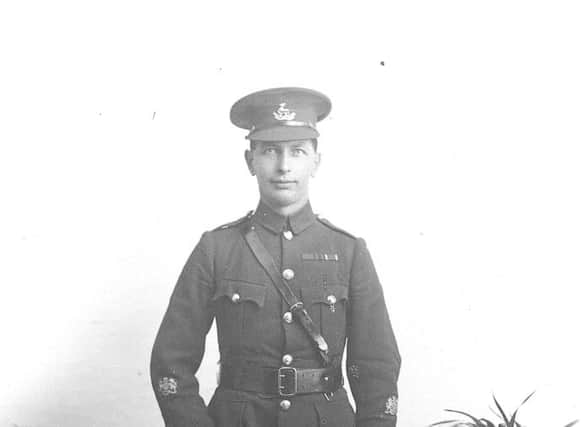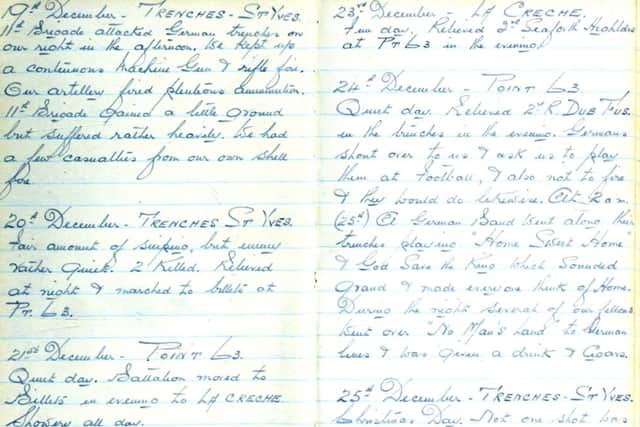Diary of famous WWI Christmas truce to be published


The Christmas Truce of December 1914, in which soliders on both sides of the conflict laid down their arms for a brief moment of fraternity, has become an enduring image of the triumph of man’s spirit over adversity.
How thanks to the poignant passages of one solider’s diaries, we can relive that famous truce, nearly a century after it took place.
Advertisement
Hide AdAdvertisement
Hide AdRegimental Sergeant-Major George Beck’s entries describe how the sworn enemies played football, shared cigars and that a German band played ‘God Save the King’, which made the British troops think of home.


His harrowing account of life in the trenches are laid bare in his handwritten entries,
He also describes the grim reality of the Somme and the use of poison gas during four years on the Western Front serving with the 1st Warwickshire Regiment.
His entry for Christmas Day 1914 notes: “Not one shot was fired. English and German soldiers intermingled and exchanged souvenirs.
Advertisement
Hide AdAdvertisement
Hide Ad“Germans very eager to exchange almost anything for our bully beef and jam. Majority of them know French fluently.”
The soldier’s immaculate handwriting also records lighter moments during the heat of battle with a snowball fight against the French. RSM Beck was awarded both the Distinguished Conduct Medal and the Military Cross in the war but turned down a commission to become an officer. He was born in Warwickshire in 1881 and enlisted in 1898.
Rising through the ranks he was promoted to colour sergeant in 1905, which enabled him to marry. In 1907 he married Eliza Attwooll, of Portland in Dorset, and settled on the island raising six children.
After the First World War, RSM Beck worked at the Duke of Yorkshire School, Dover, Kent for nearly four years until he was discharged on the grounds of ill health.
Advertisement
Hide AdAdvertisement
Hide AdHe then worked as an inspector for the Portland Bus Company before dying of pneumonia/influenza on March 20 1928 at his home in Portland. He was 47.
RSM Beck received full military honours at his funeral at St George’s Church on Portland.
Mrs Milverson said: “I am delighted that more people will now be able to learn about my grandfather’s thoughts and feelings as he wrote his diaries 100 years ago.”
As well as posting the diary extracts on the blog, the history centre will also be ‘live’ tweeting entries from the diaries a century after they were written. They can be followed on Twitter at @RSM_GBeck.
Advertisement
Hide AdAdvertisement
Hide AdThe diaries have been transcribed over many months by history centre volunteer Alison Schwalm.
She said: “It has been a privilege to transcribe these diaries written by a courageous professional soldier, a non-commissioned officer who obviously cared greatly for his comrades as well as his young family at home.”
His diaries remained with his family and have been given to the Dorset History Centre by his granddaughter Caroline Milverson.
They will now be published online from August 21 at http://news.dorsetforyou.com/rsm-beck-diary.